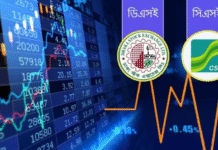
Economists are forecasting brighter days ahead for Bangladesh, stating that the country was on its way to recovery from the economic shocks of the Covid-19 pandemic.
“There are silver linings for the economic recovery of Bangladesh since it is not dependent on the tourism sector like the Maldives and future inflows from readymade garment exports are expected to be positive,” said Prof Wahiduddin Mahmud.
“What should concern us now most is the lingering effect of the lockdown, on the prospect of economic recovery and restoration of livelihoods of the poor, given the ongoing health crisis,” he said.
The eminent economist was addressing the closing session of a webinar styled “Covid-19 and Development Challenges” organised by the South Asian Network on Economic Modeling (Sanem) on Saturday evening.
Mahmud said the pandemic caused a loss of livelihoods for people employed in the informal sector along with workers of formal businesses who were temporarily laid off, resulting in an urban to rural exodus.
“Bangladesh has one of the most diverse rural sectors which cannot absorb urban workforce, which is a reversal of the development process,” he said.
Sharing his insights and observations, another renowned economist Prof Rehman Sobhan pointed out, “The notion that exists in South Asia regarding reducing poverty, which is largely derived from improved GDP growth, has to be reconsidered.”
He also said there should be strategies to integrate the informal sector into the formal stream and acknowledge their contributions.
Discussing the issue of poverty measurement, he said, “The Covid-19 pandemic has demonstrated the vulnerable economic status of the people living slightly over the poverty line.”
François Bourguignon, former chief economist at World Bank and chair emeritus at the Paris School of Economics, said: “During this crisis, economic recession is likely to raise absolute poverty with unambiguous effects on inequality.”
He discussed in detail different aspects of policies undertaken around the world to tackle the pandemic.
“Undernourishment of children due to lockdown may impact their learning capacity in the long term and cause rise in education attainment gap eventually,” he said.
Reflecting on the economic cost of lockdowns, Bourguignon observed, “There has been no real evaluation of the trade-off between saving lives and minimising incomes and as a result countries have moved from one constraint to another.”
“Informal firms might accept the cost of formalising now in order to receive government support and so it can be a good opportunity to induct a part of the informal economy into the formal economy,” he noted.
Prof Kunal Sen, director of the United Nations University World Institute for Development Economics Research, focused his discussion on the nexus of SDG efforts and the implications of the pandemic.
“The Covid-19 pandemic has affected most sustainable development goals (SDGs), except SDG-13 (Climate Action). It has caused reversal in gains in alleviating poverty and backtracking in globalisation,” said Sen.
He also shared his observations on policies regarding informal workers in South Asia.
“Policies in South Asia have been covering informal workers only through extending social support to eligible individuals without giving them access to wage subsidy and loan guarantee schemes,” he said.
Sen said there has been a huge increase in social protection schemes in Asia and Africa and whether these would be rolled back or further strengthened to fight poverty post-Covid-19 was a central issue.
Selim Raihan, executive director of Sanem, conducted the session.









